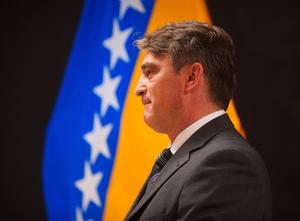On Tuesday, October 1, His Excellency Mr. Zeljko Komsic, Chairman of the Presidency of Bosnia and Herzegovina, gave a noontime Presidential Address to a standing-room only crowd at the University of Illinois at Urbana-Champaign. The event was attended by faculty, staff, students, and distinguished guests, including the First Lady of Bosnia and Herzegovina Mrs. Sabina Komsic, the Bosnian Ambassador to the United States Ms. Jadranka Negodic, the Consul General, and leaders of the Chicago and St. Louis Bosnian communities. President Komsic’s visit came about from REEEC undergraduate student Medina Spiodic’s ambitious vision, and from the growth and greater recognition of South Slavic Studies at the University. Along with REEEC, the European Union Center and the Office of International Programs and Studies co-sponsored the event. President Komsic’s visit highlighted his advocacy of cooperation across ethnic lines and strengthening links to the Bosnian-American community.
With the help of Mirella Bajric, the interpreter, President Komsic addressed the audience in his native Bosnian. He began by expressing his “pleasure to be here at the second-oldest university in Illinois.” He praised the University Libraries, and the University’s research and teaching, particularly the blossoming interest in Slavic Studies.
President Komsic then remarked on contemporary Bosnia. He observed that the majority of Bosnians are grateful for the help of the United States and the North Atlantic Treaty Organization (NATO) in stopping the war in 1995. He pointed out how Prof. Francis Boyle, of the College of Law and a REEEC faculty affiliate, was a key player in the signing of the Dayton Peace Accords. However, he acknowledged the challenges that Bosnia faces. Politically, there is a weakening of international interest in Bosnia. The international community, which had previously played a large role in ending the war and had a strong presence in the country, is now allowing local communities to lead. As a result, the Dayton Accords appear to be weakening. The country is stalled on its way to the European Union (EU) and NATO. Currently, it has not been able to fulfill the requirements for membership into both organizations. Since Bosnia lacks formal constitutional standards to equalize citizens, many Bosnians are denied basic human rights and face discrimination based on their ethnicity. President Komsic questioned how quickly and effectively Bosnia can make the necessary changes to become part of the EU and NATO.
President Komsic continued his address with a comparison between the United States and Bosnia. Both are multinational countries, but Bosnia has more work to do to repair its social divisions. In contrast, the U.S. had the strength to carry Barack Obama to the the Presidency. There were formal measures in place for him to become President, regardless of his background. According to President Komsic, Bosnia needs a government and society based on the U.S. model of individualism, not collectivism. His goal is to end discrimination and make Bosnian society comparable to that of the U.S.
In conclusion, President Komsic spoke about the Bosnian diaspora in the U.S. He praised those who became successful in their new home, but also revealed that the majority of the adult generation that escaped the war had not really adjusted to life in the U.S. They still struggle with communicating in English and long for their homeland, despite knowing that they have nothing left there. However, the young people, their children, have adapted well and are fully integrated into U.S. society. Yet, those ethnic divisions that pit Bosnian Croats, Muslims, and Serbs against each other continue to exist even within the diaspora community. President Komsic believes in the need for drawing people to the Bosnian embassy and consulates, regardless of their ethnicity. All in all, President Komsic remains optimistic. He hopes that the media will strengthen connections between Bosnia and the Bosnian diaspora.
The University of Illinois was one of several U.S. destinations following President Komsic’s address to the United Nations in New York on September 24. Prior to his campus visit, he met with the Bosnian community in St. Louis. After his day-long stay at the University, he went to Chicago to meet with the Bosnian community there.

